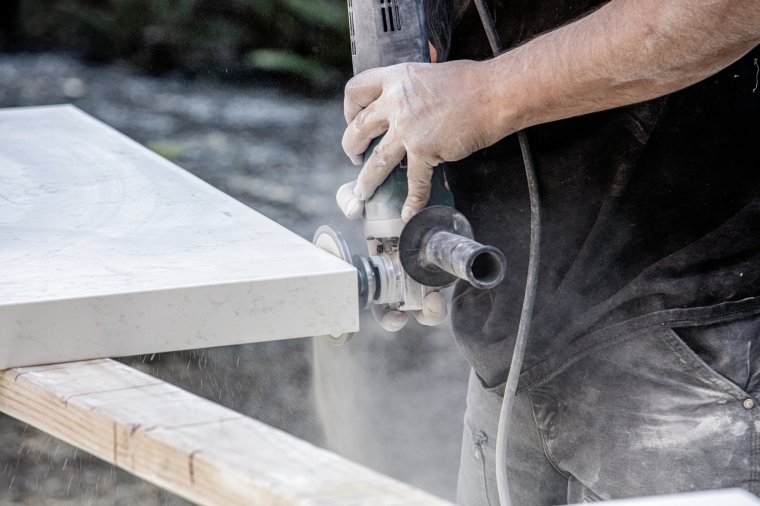A stonemason has died from a chronic lung disease after spending his last weeks warning others about the risks of cutting artificial kitchen worktops.
Marek Marzec, a father-of-three, died aged 48 at London’s Whittington Hospital on Saturday 30 November from respiratory failure due to silicosis.
He contracted the incurable illness inhaling dust from quartz-engineered – or artificial – stone worktops, which have soared in popularity among homeowners in recent years.
Mr Marzec’s cause of death has been listed as ‘artificial stone silicosis’ on the proposed death certificate.
In October, he spoke to The i Paper, describing how he worked surrounded by a “tornado” of dust so thick he was unable to see further than a yard.
His death comes amid growing calls for the Government to act to protect workers after a 28-year-old tradesman died from the same condition in the UK earlier this year.
Mr Marzec’s sister, Monika Woźniak, who lives in Poland, said: “The family and I are all very saddened by the death of Marek, who fought so bravely in the face of his diagnosis – as well as for future victims of this terrible condition – by speaking out to the media about engineered stone and the appalling conditions in which he worked.
“Marek was a beloved father and brother who will be missed by all of us, but we are proud of the legacy he has left by speaking up for the victims of silicosis.”
His solicitor, Leigh Day partner Ewan Tant, said he hopes Mr Marzec’s legacy will be a “wake-up call” for the engineered stone industry and the workplace regulator, the Health and Safety Executive (HSE).

The firm has launched legal action against three of Marzec’s former employers, alleging he was exposed to unsafe conditions that are likely to have led to his diagnosis.
“Marek was a lovely man and incredibly brave, both in how he stood up to his illness [and] also in deciding to tell his story to try to help other engineered stone workers who might end up in the same position as him,” Tant said.
“My thoughts are with his family, in particular his three daughters, who have lost their father in entirely avoidable circumstances.
“I hope Marek’s death will be a wake-up call to the engineered stone industry and the HSE that urgent action must now be taken to improve workers’ safety and avoid a repeat of this tragedy.”
The i Paper spoke to Mr Marzec from his hospital bed by which point he knew he only had weeks to live.
Mr Marzec, who arrived in the UK in 2011, spent 12 years in London and Hertfordshire cutting engineered stone slabs.
Employers failed to provide adequate safety equipment, he said, offering only face masks.
In February, The i Paper revealed the first cases of silicosis had been diagnosed in engineered stone tradesmen in the UK, most of them young migrants working in poor conditions, echoing a trend seen in other countries.
Confirmed cases have risen sharply in recent months, with 18 men now diagnosed, the youngest aged 24. Including Marzec, two have died, while another two have been referred for lung transplant assessment.
The first confirmed death prompted a coroner to demand the Government and HSE take “urgent action” to protect workers.
Wessam al Jundi, 28, died in May five days after being admitted to hospital for a lung transplant. He contracted a severe form of silicosis while working in a London workshop.
In a rare intervention, the Senior Coroner for west London, Lydia Brown, wrote to the Department of Health, the HSE and the Ministry of Housing, Communities and Local Government before an inquest into his death had been heard.
In her Prevention of Future Death report, she demanded a “timetable for action” to tackle the dangers of cutting engineered stone.
She wrote: “In my opinion urgent action should be taken to prevent future deaths and I believe you and/or your organisation have the power to take such action.”
Both parties are required to provide a response by 23 December.
A doctors’ report published in August by the British Medical Journal Thorax urged the Government to consider banning the material. The journal found the average age of the first eight cases was 34, and that one person had died.
Quartz worktops have become an increasingly popular choice for kitchen refurbishments, but the manmade stone contains high amounts of silica.
Apart from a ban, workplace safety improvements suggested by experts previously include halving the UK’s workplace exposure limit to silica dust and mandatory attendance of the HSE to businesses using engineered stone.
There have also been calls for the HSE to receive greater funding and a legal requirement for employers to report cases of silicosis.
In October, The i Paper reported that the HSE had drafted new guidelines to protect workers and highlight the dangers of practices such as dry-cutting without water suppression tools to dust.
In July, Australia became the first country in the world to ban engineered stone after hundreds of stonemasons were diagnosed with silicosis, most aged under 35, according to a report by policy body Safe Work Australia.
Almost 200 cases have occurred in California since 2019, the majority being Latino migrants, of whom 13 died.
There are also outbreaks in other countries, including Spain and Israel.
A HSE spokesperson said: “Our sympathies are with the family and friends of Marek Marzec at this time.
“We are making enquiries into his death and can confirm the Metropolitan Police has also been informed.”
The Department of Health has been approached for comment.
Have you been affected by this issue? Please contact joe.duggan@inews.co.uk


Maurice Saatchi: I used to adore capitalism – then I had lunch with Margaret Thatcher